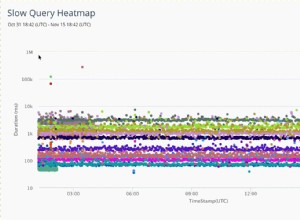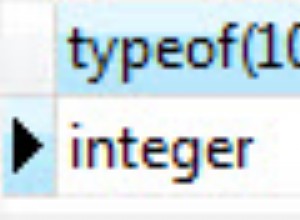Uwaga, nie sugeruje to przez minutę korzystania z MyISAM. Używam tego tylko do uzyskania moich identyfikatorów, min, max i liczenia, aby ustawić się w kolejce. Więc zignoruj silnik, proszę.
create table ratings
( id int auto_increment primary key,
thing int null
)engine=MyISAM;
insert ratings (thing) values (null),(null),(null),(null),(null),(null),(null),(null),(null);
insert ratings (thing) select thing from ratings;
insert ratings (thing) select thing from ratings;
insert ratings (thing) select thing from ratings;
insert ratings (thing) select thing from ratings;
insert ratings (thing) select thing from ratings;
insert ratings (thing) select thing from ratings;
insert ratings (thing) select thing from ratings;
insert ratings (thing) select thing from ratings;
insert ratings (thing) select thing from ratings;
insert ratings (thing) select thing from ratings;
insert ratings (thing) select thing from ratings;
insert ratings (thing) select thing from ratings;
insert ratings (thing) select thing from ratings;
insert ratings (thing) select thing from ratings;
insert ratings (thing) select thing from ratings;
insert ratings (thing) select thing from ratings;
insert ratings (thing) select thing from ratings;
insert ratings (thing) select thing from ratings;
insert ratings (thing) select thing from ratings;
Mam teraz 4,7 mln wierszy
select count(*),min(id),max(id) from ratings;
+----------+---------+---------+
| count(*) | min(id) | max(id) |
+----------+---------+---------+
| 4718592 | 1 | 4718592 |
+----------+---------+---------+
select * from `ratings` order by id limit 499500, 500;
-- 1 second on a dumpy laptop
.
explain select * from `ratings` order by id limit 499500, 500;
+----+-------------+---------+------+---------------+------+---------+------+---------+----------------+
| id | select_type | table | type | possible_keys | key | key_len | ref | rows | Extra |
+----+-------------+---------+------+---------------+------+---------+------+---------+----------------+
| 1 | SIMPLE | ratings | ALL | NULL | NULL | NULL | NULL | 4718592 | Using filesort |
+----+-------------+---------+------+---------------+------+---------+------+---------+----------------+
.
explain select * from `ratings` where id>=499501 limit 500;
+----+-------------+---------+-------+---------------+---------+---------+------+---------+-----------------------+
| id | select_type | table | type | possible_keys | key | key_len | ref | rows | Extra |
+----+-------------+---------+-------+---------------+---------+---------+------+---------+-----------------------+
| 1 | SIMPLE | ratings | range | PRIMARY | PRIMARY | 4 | NULL | 4198581 | Using index condition |
+----+-------------+---------+-------+---------------+---------+---------+------+---------+-----------------------+
Morał tej historii może polegać na użyciu klauzuli WHERE.
Nie można wykluczyć możliwości impasu.




